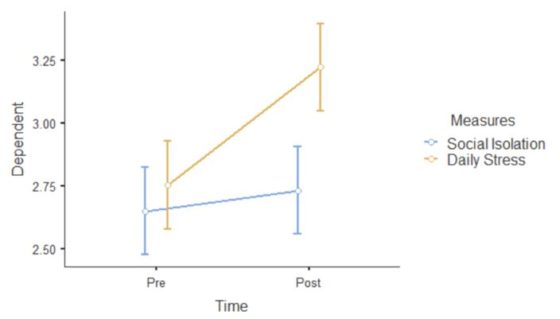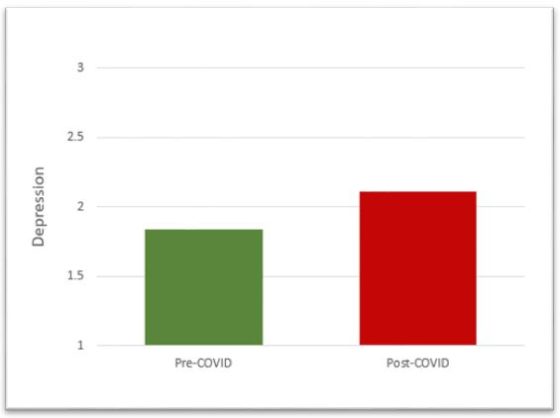Aaron Rogers, Vanessa Pearson, Courtney Ashley, & Ayars Lamar (Advisor: Chris Buchholz)

Background Information
Humans are in fact social beings by nature—in addition to food and water, we also need social interaction to be healthy. For instance, research shows that that social isolation can lead to an increase in mental disorders (Santini et al., 2020). When considering the Covid-19 pandemic, we have seen a divide between individuals through the promotion of social distancing and the temporary closure of recreational businesses such as movie theaters and amusement parks. Institutions have implemented guidelines that have affected college students to limit the spread of the virus on campus. These guidelines are seen in various ways such as online teaching, social distancing of 6 feet in food courts, and the elimination of sporting events. These necessary precautions from institutions to prevent the spread of Covid-19 have also decreased social connectivity. The point of this study is to determine if increased social isolation causes increased levels of depression and daily stress in college students. There is limited research on the effects of social isolation from the pandemic on college students.
Methods
Our study included 52 college students as participants. In order to run the study, we had participants complete three questions on depression, daily stress, and social isolation. The participants went through each of the scales twice. The first time the participants completed the section, they had to reflect on how they remember themselves feeling before Covid struck around January of 2020. Once the participants completed each section reflecting back to January, they were given the exact same questionnaire but asked to answer it with how they are feeling now in the current semester. Researchers then compared their answers pre-Covid to how they were feeling post-Covid.
Results and Discussion
We found that both social isolation and daily stress increased during the pandemic; however, only the increase in stress was statistically significant (see Figure 1). We also found that depression showed an increase that was statistically significant from pre-Covid compared to post-Covid. (see Figure 2). This indicates, that contrary to our predictions, on average participants were not reporting significant increases in social isolation. However, this is an average and the reality is that some participants did see an increase. In conclusion, the increase in depression and stress is consistent with larger national trends and that is concerning.
 Figure 1. Social Isolation and Daily Stress over time.
Figure 1. Social Isolation and Daily Stress over time.

Figure 2. Depression levels from pre-Covid to post-Covid.
Reflection
As a group, and individually, we have learned a lot about this pandemic and how it has affected the college-aged population in terms of depression and stress levels. A new normal has been set for the foreseeable future and that has been a tough pill to swallow for the Roanoke College community and for the entire world. All of us are upper-level college students, so we have seen the contrast between in-person schooling and online schooling, and it is not the same. We empathize with the new freshman because they may not have some of the same college experiences that we once had in a pre-pandemic world. Conducting this study and analyzing the data gave us an idea of how our community is feeling, and we cannot stress how important maintaining your mental health during these times are.
Conclusion
We would like people to realize how important it is to stay connected and to check up on each other during these extremely tough times. Being socially isolated has major effects on the psyche and realizing that is so important. Check in on your friends, family members, significant others, and try not to assume that everyone is doing okay during these times because more than likely someone is struggling.
References
Santini, Z. I., Jose, P. E., Cornwell, E. Y., Koyanagi, A., Nielsen, L., Hinrichsen, C., Meilstrup, C., Madsen, K. R., & Koushede, V. (2020). Social disconnectedness, perceived isolation, and symptoms of depression and anxiety among older Americans: A longitudinal mediation analysis. The lancet public health, 5(1), e62-e70.